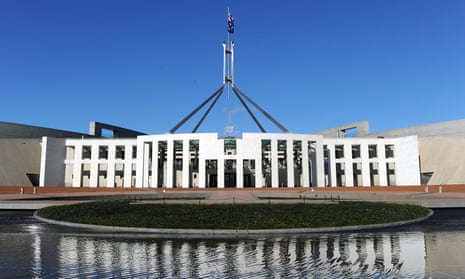A bipartisan push to ban foreign political donations is at risk of being derailed by Coalition amendments that Labor fears will effectively override state donation laws, after the government refused to back down and withdraw them.
On Monday the Coalition majority on the joint standing committee on electoral matters delivered a report calling on the Senate to pass the electoral funding and disclosure bill, provided the delineation with state laws is clarified.
The Coalition will now push ahead with the bill in the Senate next week, despite Labor and the Greens both issuing dissenting reports. Labor warned no “interference with state and territory laws” was warranted and the Greens blasted the “hypocrisy” of watering down state donation laws.
In April the committee issued a joint report with bipartisan agreement to ban foreign political donations, the primary aim of the bill, after new protections for civil society groups were added.
The consensus to pass the bill was shattered when the government added two new amendments that federal donation laws override state laws where donations “may be used” for commonwealth electoral purposes.
Several academics warned that donations made without a stipulation on how they could be spent would therefore be governed by federal laws, even if they were spent on state elections.
This sparked concerns federal law would override state donation laws – including bans on developer donations, caps and other transparency measures – and the amendments were labelled unconstitutional by a leading academic, Anne Twomey from the University of Sydney.
The majority report on the Coalition-controlled committee recommended the two controversial “state immunity” amendments be changed “to ensure that commonwealth laws would not apply to money that is directed towards non-federal campaigns (including state, territory and local government campaigns)” but otherwise proceed.
In its dissenting report, the Labor members said they were “deeply concerned” the government was pushing ahead with the amendments because they were “not warranted”.
They said that provisions such as bans on developer donations that could be overridden “have been put in place on the recommendation of anti-corruption commissions”.
Prof Joo-Cheong Tham, of the University of Melbourne, submitted to the committee that the amendments could thwart cases such as the Operation Spicer investigation into the New South Wales Liberal party allegedly taking developer donations in breach of state laws.
In their dissenting report, the Greens said the “not previously discussed” amendments would ensure that “lax federal transparency and disclosure laws override more stringent state and territory laws”.
“What hypocrisy that a bill that purports (yet fails) to restrict the influence of money in politics actively facilitates donors avoiding state restrictions on political donations,” it said.
The Greens accused the government of “using the foreign donations ban to cloak an attack on its political enemies, as well as a mechanism for circumventing state-based transparency laws”.
The Coalition majority report accepted that the amendments were “new provisions”. It noted the recent Awabdy case in which the Queensland supreme court rejected the Queensland Liberal National party’s claim that because federal and state laws were inconsistent it need not comply with the stricter state disclosure threshold.
The majority report recommended the amendments be changed to “expressly exclude the application of the commonwealth law to any funds that are used in a state or territory election”. This would “avoid an undue overreach into state and territory jurisdictions”, it said.
The Coalition members noted that Labor wanted additional time to scrutinise the changes but said they were an “important part of the disclosure regime” and should be “implemented as soon as possible”.
The finance minister, Mathias Cormann, welcomed the report and told Guardian Australia the government’s intention is “to ensure that relevant federal electoral laws apply to federal elections”.
“It never was our intention with this bill for commonwealth electoral law to apply to donations directed towards non-federal campaigns,” he said.
“If these amendments were not made, there would be ambiguity for regulated entities, and, in the light of recent court decisions, overlap between various state, territory and commonwealth laws on political donations.
“Any ambiguity and overlap would increase the regulatory compliance burden for affected entities, with multiple laws in different jurisdictions applying to the same financial transaction.”
Cormann said states could legislate to “quarantine matters relevant solely to them” for example in the way New South Wales requires that state election campaign funds be credited to a dedicated account.
